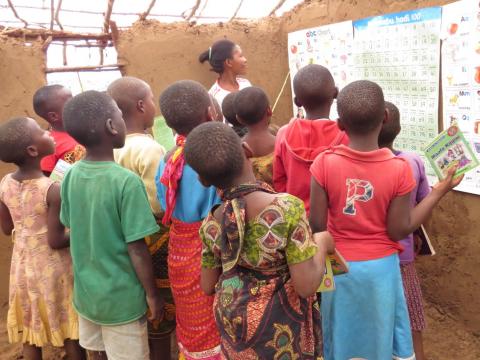Day of The Girl 2018: How reading camps are flying education high in Tanzania

Story by Gasper Nyiti – Intern, Communications
In 2011, as the result of youth advocacy around the world, the United Nations declared October 11 as the International Day of the Girl Child. Its mission is “to help galvanize worldwide enthusiasm for goals to better girls’ lives, providing an opportunity for them to show leadership and reach their full potential.” It’s a day when activist groups come together under the same goal to highlight, discuss, and take action to advance rights and opportunities for girls everywhere.
In Tanzania, Word Vision works with communities, government and other partners to achieve World Vision child wellbeing aspirations in different spheres of life including education. Through education interventions, tremendous achievements have been attained for children notably the girls. Here is one of the story of an empowered young girl following establishment of reading camps in her village through World Vision Tanzania’s Unlocking Literacy Programme.
Children at the reading camp
When you ask Joyce Malika (9) who is in grade three at Dumbalume Primary School as to why she is so pleased when a day pans out to be Saturday this is would undoubtedly be her response “it is the time where I finally catch up with some of my friends and together we go to our reading camp which was built by our community with the support from World Vision”.
Joyce attends reading camp sessions every Saturday
Joyce represents children’s who are living in extreme poverty with little access to education especially supplementary reading materials like story books and supplementary readers to improve their functional literacy but are determined to achieve their dreams. I met her at Dumbalume village, Kilosa District, Morogoro Region in the Eastern part of Tanzania where she lives with her parents and four other siblings.
The girl’s reading, Writing and Numeracy skills improved following Unlocking Literacy intervention. In collaboration with her community through frequent attendance in reading camps that are supported by WVT and managed by community volunteers, Joyce has attained functional literacy at appropriate age. “Previously I did know how to read or write, I could not read any books, or know how to write properly”. Adding “The situation affected my performance at school, after I began to attend reading camps. I started to see improvements first in reading then later writing”.
Majaliwa Chilingola a Head Teacher at Dumbalume Primary School affirms that pupils’ including Joyce’s reading and writing skills have improved following the establishment of the reading camps. Majaliwa mentions some of the reasons for poor reading and writing skills among many pupils before the intervention being overwhelming number of students compared to teachers and lack of teaching and learning materials.
Majaliwa says “Joyce report has changed significantly from being at position 34 to seven “at her class in 2018” adding “teaching and learning methodologies at the reading camps are slightly betterand more interactive. I think is what made Joyce learning improve that quickly”.
Reading camps are established as part of implementing Unlocking Literacy model to improve teaching and learning skills among teachers and students. The camps are small houses built by community members in collaboration with World Vision Tanzania and local government using locally available materials, and operates on Saturday as out of school literacy activities.
Children inside the reading camp
World Vision Tanzania in partinership with the community and the local governments identify and train community volunteers who facilitate reading and writing sessions for pupils. In addition, the organisation provides learning materials such story books for teaching and learning purposes. The reading camps provide extra hours especially on Saturdays for pupils to engage more in reading and writing thus boosting their cognitive capabilities and improves their performances in school.
Community volunteers are key in making the reading camps sustainable
Through Magole Area Program, 28 reading camps have been established benefiting more than 700 pupils, 4000 story books have been distributed and more than 50 community –selected volunteers have been trained as reading camps facilitators. The area program is supported World Vision US to attain various World Vision child wellbeing aspirations including one in education to ensure that children are ‘educated for life’.
Todate, more than 189 reading camps have been established in 21 Area Programs of World Vision Tanzania serving more than 18,000 pupils in various areas in Tanzania.
For more on World Vision Education interventions click here